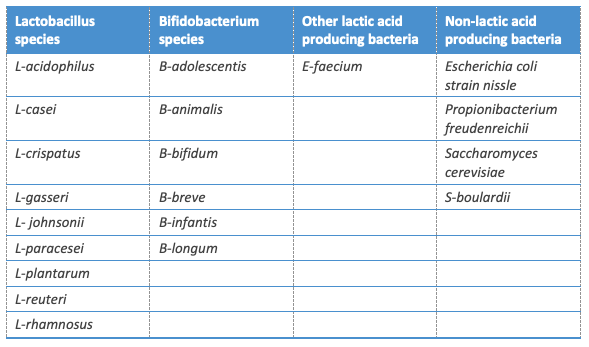Other products – Probiotics
Probiotics are live bacterial strains administered orally in an effort to alter the bacterial flora of the host towards a more positive balance.
We have already discussed in the fibre module the impact that a healthy gut flora can have on a number of different physiological markers and because of this and some preliminary trials, probiotics are theorised to have the following effects:
- Improved intestinal health
- Enhanced immune response
- Improved blood lipid profile
- Acute diarrhoea alleviation
- Alleviation of GI problems experienced post treatment with antibiotics
- Reduction in pathogenic bacteria thanks to competing for resources
In addition to the above it has been proposed that (because there is a big difference between the gut flora of bottle fed and breastfed children, and between the incidence of allergies in those same populations) probiotics may help with the avoidance of allergy development, but there is no evidence for this. There is also no evidence that allergies (specifically asthma) are helped by probiotic use once they have developed.
These benefits are exerted via short-chain fatty acid production, stimulation of mucosal barrier function (they help the cells lining the colon perform their role), immunomodulation and lowering of the gut pH (making it more acidic).
Useful bacterial genera include Lactococcus and Bifidodobacterium which are both tolerant to acid and bile, making them ideal for oral application. They adhere to mucosal and epithelial surfaces meaning that they can stay in the GI tract and exert effects on these tissues, they are antimicrobial against pathogenic bacteria and they help hydrolyse bile salts. Some specific strains of these and other genera which could prove be useful are shown in the table below:

As you can see, the list is long and complex, and of course each beneficial effect is associated to a different strain, which would be impractical to lay out here. Suffice to say that at present the only benefits of probiotic use with anything approaching robust evidence are:
- L-rhamnosus, L-casei and S-boulardii use can help against post antibiotic diarrhoea when used immediately after the antibiotic course
- L-reuteri, L-rhamnosus, L-casei and S-boulardii can help reduce acute diarrhoea in children
- L-reuteri, L-rhamnosus and L-casei can help fight rotavirus
- L-rhamnosus, S-boulardii, L-acidophilus and B-bifidum may help travellers’ diarrhoea
- S-thermophilus and L-delbrueckii subspecies Bulgaricus may be able to alleviate the symptoms of lactose intolerance by exerting enzymatic effects on the lactose. This is inconsistently shown, however, and so individuals should assess carefully whether they wish to experiment
As you can see the evidence for probiotic use is interesting but the study of these products is relatively new, and of course the correct strain (at the correct dosage, usually around 100,000,000 to 1,000,000,000 bacteria per day) must be used for any specific purpose. If you are considering probiotic use, we advise you pay very close attention to what you are taking and why, and consider alternative approaches first with probiotics being an addition. Most individuals will never need to use a probiotic.